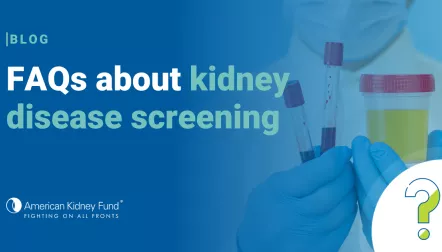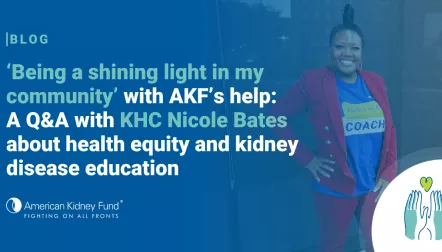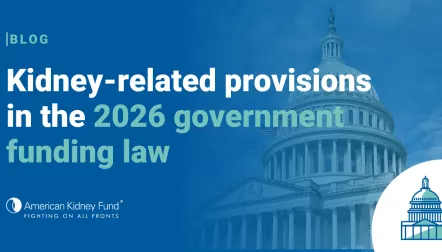
Blog post
The gift of the storm: Surviving COVID-19 as kidney transplant recipient

When I received my kidney transplant in April 2017, I had a new lease on life. Three years and a global pandemic later, my life was on the line because of the immunosuppressive medicines I take to stop my body from rejecting my transplanted kidney.
In mid-March I traveled to Washington, D.C. from my home in southern Virginia for an advocacy event related to World Kidney Day. Before traveling, I contacted my transplant center to make sure it was safe for me to take this day and a half long trip. Back then, there wasn't as much known about COVID-19 and how dangerous it could be for immunocompromised people as there is now, aside from simply knowing that we're in the at-risk category. The transplant center approved my travels and instructed me to take the precautions that are now commonplace — wearing a face mask and gloves, carrying hand sanitizer with me for when soap and water were not available, and practicing social distancing — which I did.
By the time I was traveling home from D.C., just 36 hours after I originally spoke to my transplant center, things had changed drastically. The center contacted me to let me know they recommended that I self-quarantine for the next four weeks as a precautionary measure due to the rapid increase in positive COVID-19 cases nationwide. The next day, my pastor called to tell me that one of the members of our church tested positive for COVID-19. He knows that I am immunocompromised, so he encouraged me to notify my transplant center and call the COVID-19 hotline for our area. After I told the hotline that I have a kidney transplant, am immunocompromised and have been in the presence of someone who has COVID-19, they told me unfortunately all they could do was advise me to stay quarantined since I was not showing any symptoms at that point.
My wife, Tina, who coincidentally returned home from a business trip in Tennessee on the same day I returned from D.C., was also feeling great. A couple of days later, however, Tina had a fever, began coughing and had a runny nose. I took her the emergency room and she was discharged a few hours later with no definitive diagnosis. She was also told to self-quarantine, which she did.
I soon began showing the same symptoms as Tina, except I was also nauseated and had low energy. I contacted my primary care doctor and my nephrologist every day for the next four days to update them about my condition and schedule a test to see if I had COVID-19. I took the test and waited for the results to come in. Tina became progressively worse during this time, so I took her to the emergency room for the second time in the 10 days since we both returned home from our trips.
Hospital security were not letting people accompany patients into the waiting room because of the virus, so I had to drop Tina off in the parking lot. She could barely make it to the emergency room from where security had me drop her off. She had to stop several times to catch her breath and even had to sit down on the curb to rest for a bit because she was that weak. She was admitted to the hospital with pneumonia and eventually found out she was positive for COVID-19. When my test results came back, I found out I also tested positive. My symptoms stayed pretty much the same for the next few days.
Tina was released from the hospital after six days and we made sure to socially distance from each other as much as possible at home while I was taking care of her. We also wore masks at home and made sure to practice the handwashing techniques suggested by the CDC. As Tina started to get better over the next couple of weeks, I started to get worse; I had low energy, confusion, blurred vision, decreased urine production, body aches, chills, coughs, dizziness and chest tightening. I went to the hospital for tests but luckily never had to be admitted.
As Tina and I continue to recover from the effects of COVID-19 on our bodies, here are a few tips that helped us to survive the worst of this storm:
- Stay in a state of readiness. During a telehealth visit with my doctor during quarantine, we discussed my emergency medical readiness plan. In this plan, I keep an updated list of medicines, emergency contact numbers, health summaries, a 3-week supply of non-perishable kidney-friendly foods and a 90-day supply of my immunosuppressant medicine.
- Practice what you preach. In February 2018, I changed my nutritional lifestyle so I can be as healthy as possible and keep my transplanted kidney. Being diabetic, I am eating to manage that condition as well. I had lost almost 75 pounds since February 2018, and Tina and I lost an additional combined total of 32 pounds due to the toll COVID-19 took on us. Since I have learned to manage my health better than in the past, my weight loss physician felt it might have contributed to me surviving COVID-19 even though I have two of the major risk factors (diabetes also puts people at high risk).
- Find your peace amid the storm. While Tina and I were recovering, we had to figure out where our inner peace had gone. Watching and reading the news and checking social media were beginning to suck our mental wellness dry — nothing was positive, encouraging or motivating. We decided to temporarily separate ourselves from the world and shut everything and everyone out except for our medical care team, church clergy and close, trusted family and friends. Being sick with COVID-19 and trying to maintain my other illnesses was exhausting and burdensome. Having an opportunity to decompress and sit peacefully for my mental health allowed me to focus on my wife and assist her with her recovery, as she did for me.
- Seeing the "gift of the storm." One of the greatest lessons that I have learned about this pandemic is how important our faith is, amidst our affliction, as well as our healing. I listened to the doctors, nurses, researchers, and scientists, but I heard God. In the beginning, middle, and end of the storm, COVID-19 is not bigger than our faith, which only strengthened. Our belief is what allowed us to endure the storm through our healing, comfort and restoration.





